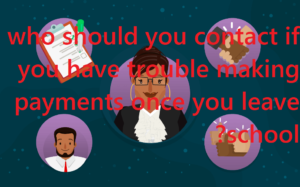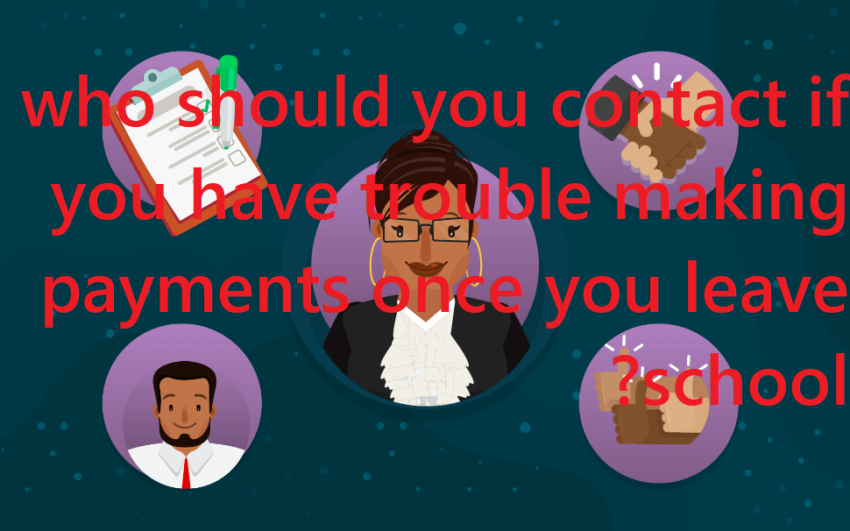“Who to Contact If You Can’t Make Payment After Graduation”
Graduating from college is an amazing accomplishment that should be celebrated. However, for some graduates, the party may be cut short when they realize they can’t make their student loan payments. If you find yourself in this situation, don’t panic. There are options available to help you make your payments. Your first step should be to contact your loan servicer. They will be able to help you understand your repayment options and can provide assistance if you’re having trouble making payments. If you’re still having trouble after speaking with your servicer, you can contact a nonprofit credit counseling agency. These agencies can help you create a budget and negotiate with your creditors. There are a number of options available to help you if you can’t make your student loan payments after graduation. By speaking with your loan servicer or a credit counseling agency, you can find a solution that works for you and get back on track with your loan repayments.
Contact your loan servicer as soon as possible Identify your options Consider deferment or forbearance Look into loan consolidation Think about refinancing

Contact your loan servicer as soon as possible
If you can’t make payment after graduation, it’s important to contact your loan servicer as soon as possible. This way, you can discuss your options and find a solution that works for both of you. Your loan servicer is there to help you, so don’t be afraid to reach out if you’re having trouble making payments. You can discuss your options and figure out a plan that works for both of you. If you’re not sure who your loan servicer is, you can check your loan documents or look them up online. Once you’ve found their contact information, give them a call or send them an email. Explain your situation and why you’re having trouble making payments. Your loan servicer will be able to help you figure out a plan to get back on track. There are a few things you can do if you’re having trouble making payments on your student loans. You can extend your repayment period, lower your monthly payments, or consolidate your loans. Your loan servicer can help you figure out which option is best for you. If you’re struggling to make payments, don’t wait to reach out to your loan servicer. They can help you find a solution that works for both of you.
Identify your options
If you cannot make payments after graduation, you have a few options. You can try to negotiate with your lender, look into government programs, or consolidate your loans. If you cannot make payments, the first thing you should do is contact your lender. Many times, they are willing to work with you. They may be able to lower your payments, give you a grace period, or put you on a repayment plan. If you cannot make payments, you should also look into government programs. These programs can help lower your payments or even forgive your loans. You can also consolidate your loans. This can lower your payments and make them more manageable.
Consider deferment or forbearance
If you’re having trouble making your student loan payments after graduation, you have a few options. One is to defer your loans, which means you temporarily postpone making payments. This can be a good option if you go back to school or experience a financial hardship. Another option is forbearance, which allows you to temporarily reduce or stop making payments. This can be a good option if you’re experiencing financial hardship or are having trouble finding a job. Both deferment and forbearance have their pros and cons, so it’s important to weigh your options before choosing one. You should also contact your loan servicer to discuss your options and find out what’s best for your situation.
Look into loan consolidation
If you’re having trouble making payments on your student loans after graduation, you may want to look into loan consolidation. This involves combining all of your loans into one loan with one monthly payment. This can help make your payments more manageable and help you pay off your loans more quickly. There are a few things to consider before consolidation, such as whether or not it will lower your interest rate or monthly payment. You’ll also need to make sure you can qualify for consolidation. To do this, you’ll need to have good credit and a steady income. If you’re not sure if loan consolidation is right for you, you can talk to a financial advisor. They can help you understand your options and make the best decision for your situation.
Think about refinancing
If you’re struggling to make payments after graduation, your first step should be to contact your lender to discuss your options. You may be able to defer or forbear your loans, which would allow you to temporarily stop making payments or make smaller payments. If you’re unable to make any payments, you may be eligible for loan forgiveness programs. You can also consider refinancing your student loans. This means taking out a new loan to pay off your existing loans. Refinancing can help you get a lower interest rate, which can save you money over the life of your loan. You may also be able to extend the term of your loan, which could lower your monthly payments. When you refinance, you may be able to choose between a fixed-rate and a variable-rate loan. A fixed-rate loan has an interest rate that remains the same over the life of the loan, while a variable-rate loan has an interest rate that can change. Before you refinance, it’s important to compare offers from multiple lenders to make sure you’re getting the best deal. It’s also important to consider the terms of your new loan and whether you’ll be able to make the payments. If you’re considering refinancing, you should contact your current lender to see if they offer any programs that could help you lower your payments.
If you’re struggling to make Payment after graduation, don’t hesitate to reach out to your school’s financial aid office or the lender directly. There are many options available to help you get back on track.

